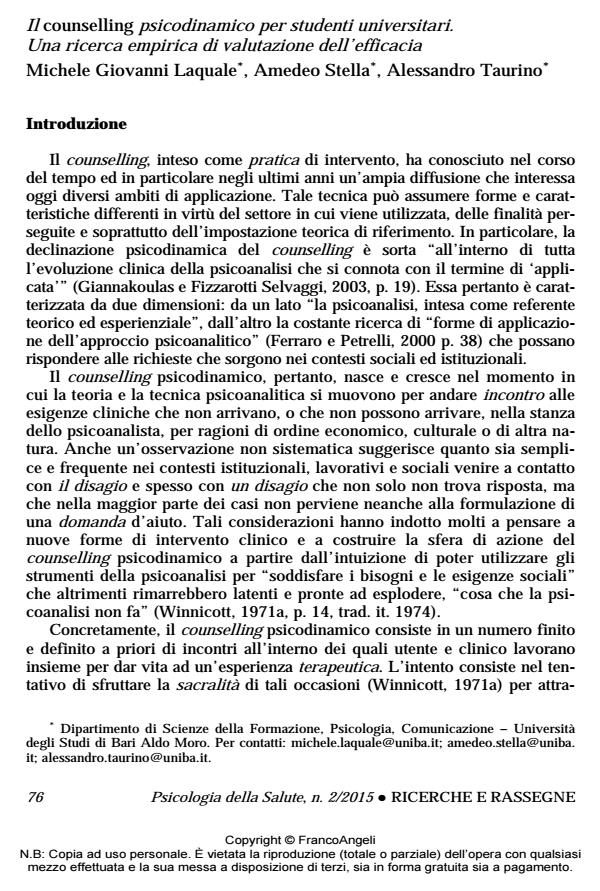The Effectiveness of Psychodynamic Counselling for University Students
Journal title PSICOLOGIA DELLA SALUTE
Author/s Michele Giovanni Laquale, Amedeo Stella, Alessandro Taurino
Publishing Year 2015 Issue 2015/2
Language Italian Pages 25 P. 76-100 File size 116 KB
DOI 10.3280/PDS2015-002005
DOI is like a bar code for intellectual property: to have more infomation
click here
Below, you can see the article first page
If you want to buy this article in PDF format, you can do it, following the instructions to buy download credits

FrancoAngeli is member of Publishers International Linking Association, Inc (PILA), a not-for-profit association which run the CrossRef service enabling links to and from online scholarly content.
The present research evaluates the effectiveness of psychodynamic counselling for university students. The clinical group is made up of 79 students who asked for help at the Psychological Counselling Service of the University of Bari. They took part to 5 sessions of psychodynamic counselling, once per week, with a psychodynamic psychotherapist. The non-clinical group (control group) is made up of 79 students matching the clinical participants as long as sex, age and faculty are concerned. They had never taken part to any psychological treatment. All the students were asked to complete twice the Adjective Check List (ACL: Gough and Heilbrun, 1980). They completed it for the second time five weeks after the first. The analysis of results shows that non-clinical participants experienced no change, while clinical participants, after the treatment, improved their well-being, even though they experienced a decrease of their creativity.
Keywords: Counselling, psychodynamics, university, effectiveness, outcome
- Detecting and Managing Mental Health Issues within Young Adults. A Systematic Review on College Counselling in Italy Alberto Ghilardi, Chiara Buizza, Egle Miriam Carobbio, Rossella Lusenti, in Clinical Practice & Epidemiology in Mental Health /2017 pp.61
DOI: 10.2174/1745017901713010061 - L'efficacia del counseling universitario durante la pandemia da Covid-19. Un'indagine pilota sul benessere degli studenti Luigi Tinella, Anna Lacerenza, Concetta Papapicco, Tiziana Lanciano, Alessandro Taurino, Amedeo Stella, Antonietta Curci, in PSICOLOGIA DELLA SALUTE 3/2021 pp.143
DOI: 10.3280/PDS2021-003015 - The effects of university psychological counseling on students’ mental health in the COVID- 19 pandemic era Luigi Tinella, Patrizia Borrelli, Tiziana Lanciano, Maria Cristina Epifani, Alessandro Taurino, Antonietta Curci, in Current Psychology /2025 pp.11334
DOI: 10.1007/s12144-025-07781-4 - The prevalence of mental health conditions and effectiveness of psychological interventions among university students in Italy: A systematic literature review Gaia Caldarelli, Barbara Pizzini, Marina Cosenza, Alda Troncone, in Psychiatry Research 116208/2024 pp.116208
DOI: 10.1016/j.psychres.2024.116208 - Academic performance-related stress levels and reflective awareness: the role of the elicitation approach in an Italian University’s psychological counselling Giulia Savarese, Antonio Iannaccone, Monica Mollo, Oreste Fasano, Nadia Pecoraro, Luna Carpinelli, Pierpaolo Cavallo, in British Journal of Guidance & Counselling /2019 pp.569
DOI: 10.1080/03069885.2019.1600188 - Humanity in Psychology Giulia Savarese, Nadia Pecoraro, Oreste Fasano, Monica Mollo, Luna Carpinelli, pp.225 (ISBN:978-3-031-30639-6)
Michele Giovanni Laquale, Amedeo Stella, Alessandro Taurino, Il counselling psicodinamico per studenti universitari. Una ricerca empirica di valutazione dell’efficacia in "PSICOLOGIA DELLA SALUTE" 2/2015, pp 76-100, DOI: 10.3280/PDS2015-002005